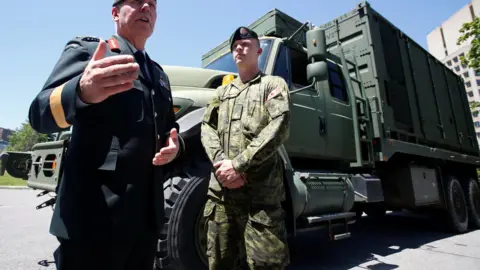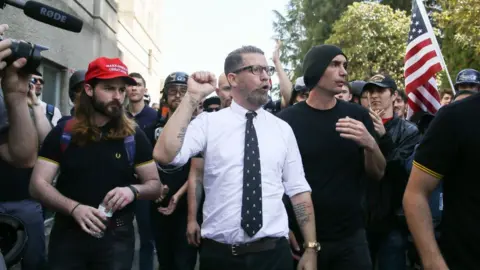'Proud Boys' back in Canada military after crashing indigenous ceremony
 Reuters
ReutersCanadian military personnel who were suspended after crashing an indigenous ceremony are back on regular duty.
The five men identify as members of the "Proud Boys", a right-wing group with chapters in the US and Canada.
They were suspended after they crashed a 1 July protest in Halifax, Nova Scotia marking Canada's history of atrocities against indigenous people.
After being reinstated, they were warned "further inappropriate behaviour could result in their termination".
On Thursday, the military announced that four of the five men had returned to duty in early August, and that the fifth man under review had voluntarily quit.
Rear-Admiral John Newton told reporters during a press conference that the men had displayed "behaviour inconsistent with the values and ethics expected of those in uniform" and that they would remain on probation.
"If they fail. they are gone," he said. "This is not lightweight punishment."
On Facebook, the Proud Boys describe themselves as "a fraternal organisation of Western Chauvinists who will no longer apologise for creating the modern world". Founded by Vice co-founder Gavin McInnes, members have organised rallies in Denver, Colorado and participated in recent protests in Charlottesville, Virginia.
 Getty Images
Getty ImagesOn 1 July, Canada Day, five members of the Canadian military interrupted an indigenous ceremony in Halifax carrying Canada's former national Red Ensign flag, which includes the Union Jack and went out of official use in 1965 after being replaced by the maple leaf design.
In a video of the incident, one woman is heard asking: "What caused you to feel the need to bring a British flag?"
One man responds: "Because it is a British colony."
"You are recognising your heritage and so are we," another says, before they depart without further incident.
The First Nations ceremony was held next to the statue of the city's founder, British military officer Edward Cornwallis.
Halifax is in the midst of a long debate over how the city commemorates Cornwallis, who in 1749 placed a bounty on the scalps of Mi'kmaq people after they rebelled against the British.
